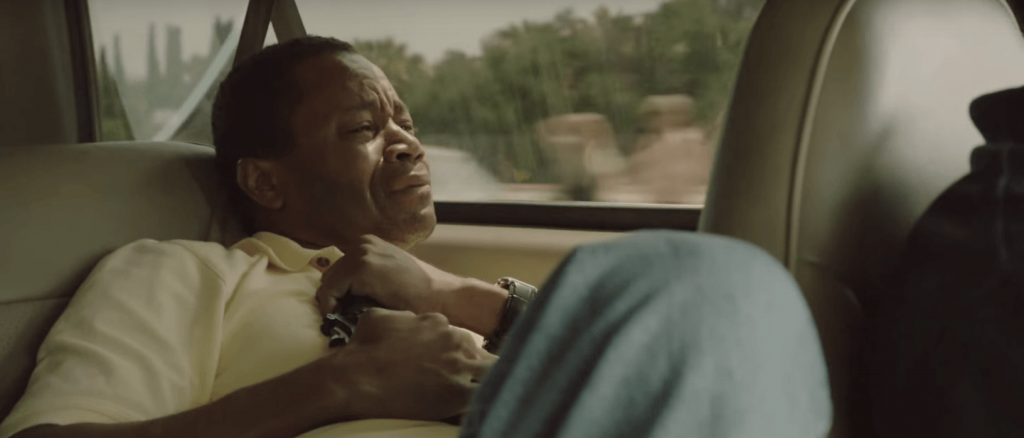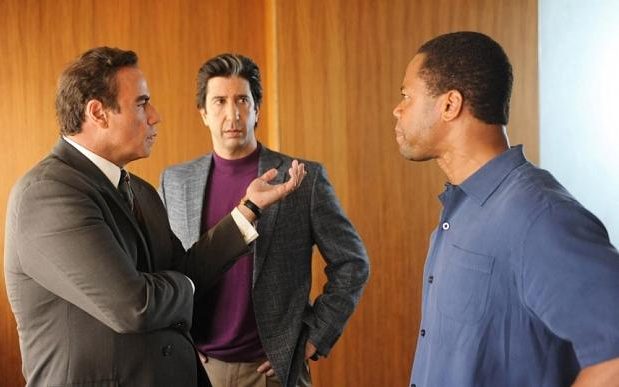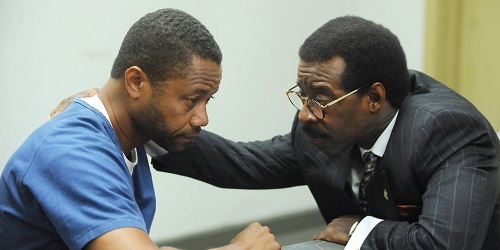I think that like most of us, I started watching The People v. O.J. Simpson: American Crime Story for shits and giggles. An all-star cast dramatizing the Trial of the Century, one of the first huge cultural moments I can actually personally remember, with all the subtlety and nuance the American Horror Story brand could bring to the proceedings. We’d get all our favorites: the Isotoners, the white Bronco, Mark Fuhrman’s racist tapes, all the big hits we remember from our childhood favorite, “The O.J. Trial On Every Goddamn Channel,” pantomimed by some of the most over-the-top actors working today.
We got that, but amazingly, it wasn’t just a highly entertaining trash fire. Beating all the odds, American Crime Story is more than just entertaining: It’s good.
It hits the ground running and doesn’t let up; in the first episode, we’re introduced to Cuba Gooding Jr.’s unstable, manic, borderline delusional O.J. Simpson, clearly living on a different plane of reality from everyone else in the show; co-creators Scott Alexander and Larry Karaszewski (Problem Child 2, The People vs. Larry Flynt) don’t make an explicit statement as to Simpson’s guilt, but the tenor of the narrative makes it fairly clear that they, and Gooding, are operating from the same place: “well, no shit of course he did it, and we don’t need to spell it out to make that obvious.” The murders occurred, off-camera, before the very first frame, and Gooding plays O.J. as a man clearly consumed with guilt, but, perhaps, so completely full of his own shit that he may actually have convinced himself that he’s innocent.
After the brilliant White Bronco Chase-focused second episode, though, Simpson rapidly starts retreating into the narrative’s background, popping up every once in a while to deliver a showstopping line like “I’m not black, I’m O.J.!” That’s because, in a very real way, the crime story of The People v. O.J. Simpson isn’t actually O.J.’s alleged murder of Nicole Brown and Ron Goldman. The murder itself was a malicious, evil and unfortunately all too common and banal revenge crime seemingly perpetrated by yet another spurned husband who just can’t believe his wife would leave him after he beat her so hard she called 911. That’s not a ten-episode TV series. The crime is the trial, and that crime is a heist.
Immediately after Simpson is under suspicion, he puts together his team of lawyers, and make no mistake: starting with loyal friend and, to a large degree, audience surrogate Robert Kardashian (David Schwimmer), through Robert Shapiro (John Travolta), and ending at the fiery wild card Johnnie Cochran (Courtney B. Vance), the formation of the legal Dream Team that granted O.J. his ill-deserved freedom owes far more to the plot mechanics of a heist story than a traditional legal drama. This isn’t a team of friends or long-standing colleagues; it’s a carefully engineered team of specialists assembled to pull off a single job: manipulating the highly charged state of race and gender relations in post-Rodney King Los Angeles to deny a pair of grieving parents justice.
The Dream Team, much like the 1992 Olympic men’s basketball team with which it shares a name, is a bunch of big-swinging-dick huge-ego expensive-suit motherfuckers all in it for various reasons. Some of them are noble: Robert Kardashian, for instance, played as perpetually exhausted and naïve by Schwimmer, never, ever refers to Simpson as anything other than “the Juice,” and truly can’t conceive that his best friend committed such a horrible murder. It’s almost a sympathetic take, until you realize that he also muffled his ears about the years of abuse leading up to it. Shapiro’s here for prestige and money; F. Lee Bailey (Nathan Lane) is trying to resurrect his alcohol-stained career; Alan Dershowitz (Evan Handler) is there for his ego, and Johnnie Cochran… well, it’s tough to figure out exactly why Cochran’s there. The show hints at a number of possible motives for him, but a number of questions—does he believe O.J. is innocent?—make it difficult to be certain. The show’s far more interested in figuring out Cochran’s how than his why. In the fourth episode, Chris Darden (Sterling K. Brown) describes Cochran’s flamboyant oratory style thus: “If he sounds like a preacher, it’s because he goes to church every Sunday.”
Which brings us to the the prosecution team—Darden, Bill Hodgman (Christian Clemenson), and the closest thing the show has to an honest-to-God protagonist, Marcia Clark (Sarah Paulson). Darden’s the pragmatic real-talker and Hodgman’s the loyal assistant, but it’s Clark that absolutely steals the show: a chain-smoking Quixotic figure completely unable to comprehend that a case this so obviously cut-and-dry to her would get buried under the layers of nuance, doubt, cultural context and just plain bullshit when debated to the courtroom. They’re smart, talented people who overestimate the judicial system and the American populace, unable to comprehend of the degree to which Simpson’s Dream Team would control the narrative, playing the media like a fiddle.
This media control, of course, is one of the most fascinating things about the show: as much as it’s a heist movie about American justice, it’s also the origin story of the modern American 24/7 news cycle: the clickbait, the hot takes, and the manner through which technology and dissemination of information can allow a savvy oligarchy to—at least for a while—control the narrative through pure inundation, a prototype of the Donald Trump and Rob Ford strategies. One of the more bizarre subplots involves Robert Kardashian attempting to instill in his children —you know, the ubiquitous reality show stars—the values of loyalty and integrity over the fleeting pleasures of fame. It’s a somewhat distracting but also somewhat effective way of drawing a throughline from the media manipulation of 1995 to that of today, a reminder that we’re seeing—literally and figuratively—the nascent form of the 2016 media machine, forming in the amniotic fluid that was America captivated by the story of a star athlete brought low.
The combined effect of all of this is a weird fever dream, a pantomime of one of the most iconic stories of the 1990s portrayed by some of today’s most iconic actors, taking advantage of the ironic distance generated by recognizable faces like Schwimmer and Travolta chewing scenery like sixteen-year-old rave kids who lost their pacifiers, portraying faces that were just as famous and recognizable twenty years ago. Rather than draw you away from the story, the proliferation of stunt casting in this show instead draws you in. The constant reminders that this is a dramatization, rather than a docu-drama, only makes the show more compelling, and that transparency allows it to be less guarded about its intent. Bereft of the expectations of slavish accuracy, The People v. O.J. Simpson isn’t the story of the O.J. Simpson trial, it’s a story about the O.J. Simpson trial. And that’s what makes it must-watch television.
American Crime Story: The People vs. O.J. Simpson airs Tuesday nights at 10pm.




David Uzumeri is one hell of a writer … That’s all.